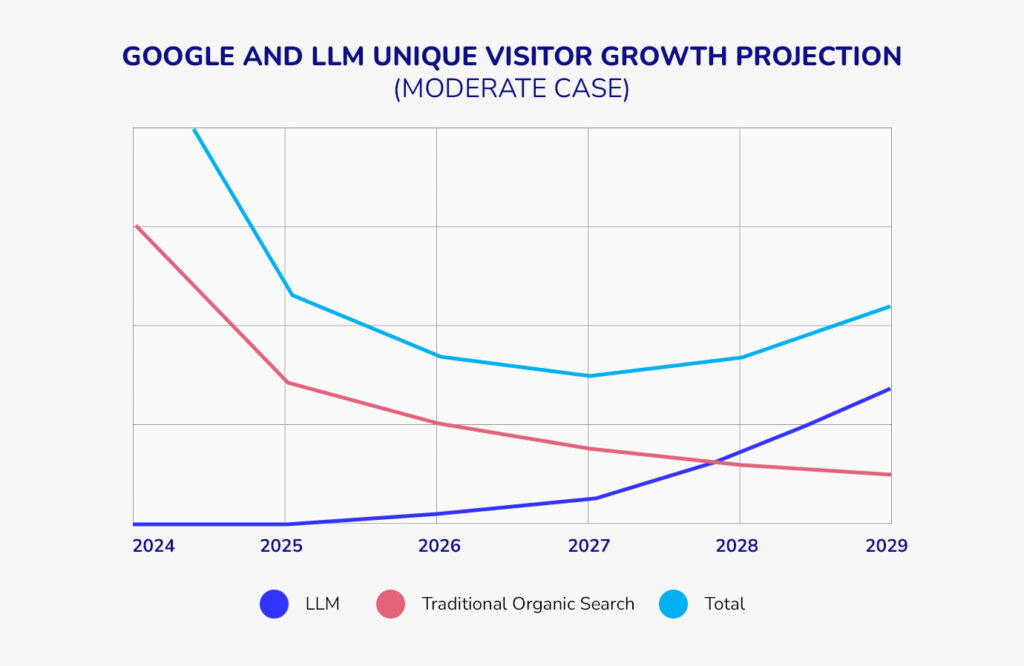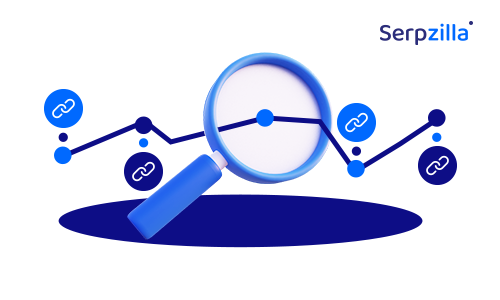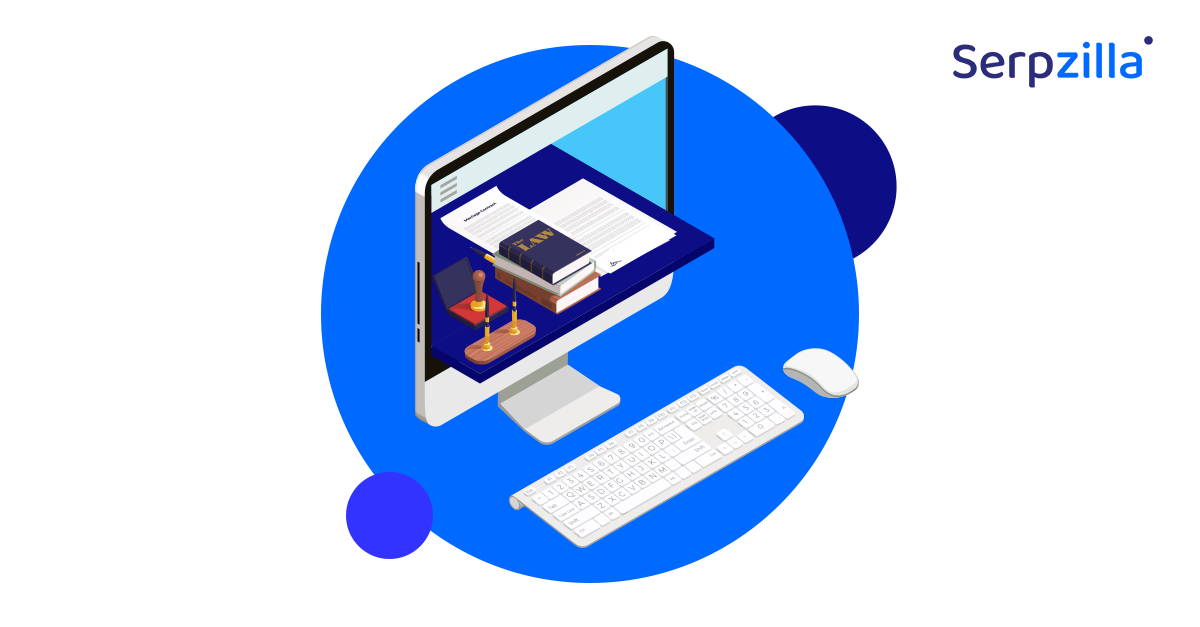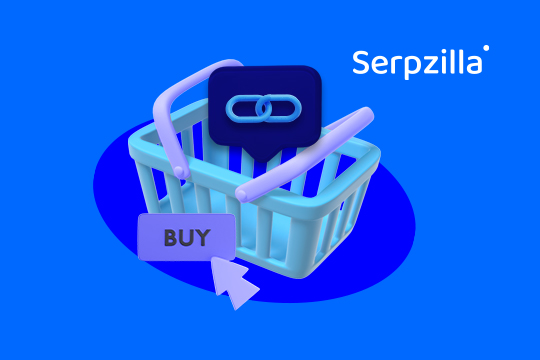The age of search as we knew it is ending. At the recent Spotlight conference by Semrush this was the talk that everyone talked.
When Google introduced AI Overviews and Microsoft followed with AI-driven Bing experiences, the familiar “rank–click–convert” funnel began to collapse. Even top-ranked pages suddenly lost up to 50% of organic clicks when AI answers appeared above them in search results.
For example, Backlinko reports that over the last three months their clicks dropped by 15% while impressions skyrocketed by 54%:

At the same time, users’ behavior changed: instead of browsing through ten blue links, they ask a question and trust the Large Language Model (LLM) to summarize, compare, and recommend. In this new ecosystem, ranking no longer guarantees traffic. Neither does it guarantee visibility, unless you appear in the AI summary. What matters now is whether AI systems cite, quote, and trust your brand in their generated answers.
This shift gave rise to a new discipline: LLM SEO: optimizing content and brand presence for visibility inside large language models rather than only in traditional search results.
What Is LLM SEO and How Does It Work?
LLM SEO (Large Language Model Search Engine Optimization) is the process of improving how your brand, website, or content appears in AI-generated answers created by systems such as Google’s AI Overviews, ChatGPT, Claude, Perplexity, or Bing Copilot.
Unlike classic SEO, which focuses on ranking in SERPs and driving clicks, LLM SEO aims to make your brand part of the “training and reasoning data” that language models rely on when composing an answer. In other words — instead of optimizing for position, you optimize for citation and trust.
How LLMs Analyze and Interpret Content
Large Language Models don’t “crawl and index” content in the same way as Googlebot. They analyze language patterns, context, and consensus across millions of sources to generate an answer that sounds accurate and balanced.
Here’s how that affects your content:
- Context over keywords. LLMs interpret meaning rather than literal matches. Clear, coherent topic coverage matters more than keyword density.
- Consistency and authority. Models prioritize sources that show expertise, authorship, and consistency across multiple pages — aligning with Google’s E-E-A-T (Experience, Expertise, Authoritativeness, Trustworthiness).
- Structured and factual data. Lists, FAQs, tables, and schema markup help LLMs extract facts easily and quote them in answers.
- Brand signals in multiple ecosystems. LLMs reference websites, Reddit, YouTube, and community discussions — the new “data commons” of real user experience.
When a model answers a query, it pulls from the most cited and semantically relevant sources — often blending factual data from trusted domains with conversational context from forums and videos.
What Factors Influence Whether a Website Appears in LLM Responses?
Optimizing SEO for LLMs requires thinking beyond search rankings. The key factors that determine if your brand gets mentioned or cited include:
- Citation Presence: Are you referenced in the datasets or content ecosystems LLMs scan (news, blogs, community threads)?
- Topical Depth: Do your pages cover topics comprehensively enough for an AI to quote or summarize them?
- Reputation Signals: Do other authoritative sites or users reference your content?
- Format Accessibility: Is your content structured in a way AI can easily parse (clean markup, clear sections, metadata)?
- Cross-platform Authority: Are you present on platforms like Reddit, YouTube, and expert forums — now major feeders of “real experience” to models?
- Brand Sentiment: Do discussions around your brand convey expertise and reliability?
In short, LLM SEO is about training the AI to know and trust you.
Your brand’s future visibility depends less on how you rank, and more on how AI systems learn to talk about you.
Why Are LLM SEO Strategies Crucial in 2025
The Shift: From Search Rankings to AI Visibility
Only a year ago, “AI SEO” sounded like a buzzword and it seemed crazy to try and optimize your content for AI. But once, again, crazy is simply being right too early. In 2025, it defines the new reality of digital visibility.
According to data shared at Semrush Spotlight 2025, 95% of SEO professionals reported stagnant or declining organic traffic. Even when their rankings stayed stable. Of course, you have already guessed the culprit. AI Overviews and AI-driven summaries in search results that absorb clicks before users ever reach the website.
When AI can answer the query directly, your visibility depends not on your position but on whether the model cites your content.
This is why LLM SEO strategies are becoming a survival skill for brands that rely on organic acquisition.
The Great Shift in Search Behavior (2023 → 2025)
| Metric | 2023 | 2025 | Change |
| Average organic CTR (top 3 positions) | 58% | 29% | ▼ –50% |
| Queries with AI Overviews in Google | <5% | 35%+ | ▲ +600% |
| Share of users who start with AI tools (ChatGPT, Perplexity, Bing Copilot) | 8% | 41% | ▲ +412% |
| Average session depth (clicks per query) | 4.2 | 1.9 | ▼ –55% |
| Conversion rate per organic visitor | 2.4% | 3.6% | ▲ +50% |
🟢 Insight: Surprisingly enough, when traffic declines, conversions can rise. This is a clear indication that users who reach websites through AI-assisted journeys are more informed and ready to act.
From “Ranking for Keywords” → “Earning Mentions in AI Models”
Old Approach (Pre-AI Era):
- Focused on technical SEO, backlinks, and keyword density.
- Success metric: Top-3 ranking positions and CTR.
- Optimization aimed at algorithms, not meaning.
New Approach (LLM SEO Era):
- Focuses on topical authority, brand citations, and community presence.
- Success metric: Frequency and quality of brand mentions in AI-generated answers.
- Optimization aimed at language models and semantic networks.
What Happens If You Ignore LLM Optimization
Ignoring the LLM shift doesn’t just cost traffic — it erases your presence from the fastest-growing search layer of the web.
Here’s what’s at stake:
- Citation loss: AI models stop referencing your site, even when you have strong SERP positions.
- Reduced brand trust: Competitors dominate conversational spaces (Reddit, forums, expert blogs) — and AI learns their perspective, not yours.
- Data invisibility: Your content becomes underrepresented in model training data and AI Overviews.
- Wasted SEO investment: Traditional SEO gains fail to translate into real visibility.
- Slower lead generation: AI assistants recommend competitors’ solutions because your brand isn’t recognized in context.
- Citation gap grows: Every new model release compounds the distance between your brand and those AI already “know.”
In short, LLM SEO strategies in 2025 have dramatically shifted from an experimental branch of optimization to being the new baseline for visibility, authority, and organic conversions, all because the search ecosystem of today is dominated by AI intermediaries.
Get Your Content Found by AI: Actionable LLM SEO
The major factor that distinguishes LLM SEO strategy is that it finally shifts from chasing algorithms. Instead, it focuses on training AI models to recognize, understand, and trust your content.
Below are actionable techniques to use if you want your pages to become a part of the data ecosystem that powers AI-generated responses.
How Should Content Be Structured for LLM Readability?
Large language models process information differently from traditional search crawlers. They rely on semantic segmentation and token prediction, meaning they read and “reason” through your text in chunks of meaning, not just HTML tags.
To make your content LLM-friendly, focus on clarity and scannability:
✅ Use clear heading hierarchy (H2–H3–H4) — LLMs rely on logical structure to understand topical relationships.
✅ Keep paragraphs short (50–80 words) — long blocks increase token noise and reduce context precision.
✅ Use lists, tables, and definitions — structured data helps the model extract facts efficiently.
✅ Include FAQs and “what/why/how” phrasing — conversational patterns align with how people query AI.
✅ Embed concise summaries at the end of each section — AI systems often quote these directly.
Conversational and Contextual Writing Matter
AI models value natural, contextual flow and don’t pick up on sources with robotic keyword stuffing. When users interact with AI tools like ChatGPT, they expect responses that sound human and empathetic. Content written in a dialogue-like, reader-focused tone is more likely to be quoted and summarized by LLMs.
Dry SEO Style (old):
“Our company provides personnel recruitment services in multiple industries. We use efficient hiring software to match qualified candidates with job openings quickly.”
Conversational LLM Style (new):
“Finding the right person shouldn’t take months. Our recruiters combine human insight with smart automation to connect companies and candidates faster and with better fit.”
In the second example, tone and rhythm mimic the way real users ask and answer questions. LLMs detect that conversational intent and treat such phrasing as contextually relevant, improving chances of inclusion in AI-generated summaries.
How Can Brands Share Original Data and Insights Effectively?
One of the strongest signals for LLM SEO is unique, verifiable information — data that models can’t find anywhere else.
When your brand publishes fresh research, statistics, or survey results, it positions you as a primary source — which AI systems prioritize for citation.
| Type of Data | Why It Matters for LLMs | Example |
| Proprietary research & reports | Adds unique factual grounding; frequently cited | “2025 LLM SEO Benchmarks Report by Serpzilla” |
| Original case studies | Demonstrates experience (E-E-A-T) | “How link velocity impacts LLM visibility” |
| Expert quotes & interviews | Reinforces authority and human expertise | “According to SEO strategist Elizaveta …” |
| Visualized data (graphs, charts) | Easier for models to parse and summarize | CTR decline chart or comparison table |
| Aggregated insights (Reddit, YouTube, forums) | Mirrors “real experience” data models ingest | Synthesized user feedback sections |
📈 Data insight (Semrush Spotlight 2025):
Pages that contained original data or case studies were 3.4x more likely to be cited in AI Overviews or Bing Copilot responses than those relying on generic content.
How to Integrate E-E-A-T into LLM-Focused Content
LLMs use E-E-A-T (Experience, Expertise, Authoritativeness, Trustworthiness) signals as a proxy for content credibility. The acronym itself originates from Google and defines its policy on content trustworthiness, but for LLMs it created a good base for how models decide which sources to reference.
To optimize for both SEO and LLMs:
| E-E-A-T Factor | Implementation Tip for LLM SEO |
| Experience | Add firsthand insights (“Based on 1,000 campaigns we analyzed…”). |
| Expertise | Display author credentials and link to verified profiles (LinkedIn, research pages). |
| Authoritativeness | Earn mentions and backlinks from reputable sources platforms like Serpzilla can help build this network efficiently. |
| Trustworthiness | Ensure transparency: dates, citations, references, and clear disclaimers on assumptions. |
Integrate these into your existing SEO strategy by building a knowledge graph of your brand interlinking key pages, bios, and original research. This helps both search crawlers and AI systems understand your site’s credibility relationships.
What Are the Best Tools for LLM SEO Optimization?
The growing role of AI-generated answers has created a new demand for tools that track brand visibility inside LLMs in addition to search rankings. While traditional SEO tools still matter, it’s also apparent that they no longer tell the full story of how users find and interact with content through AI platforms.
In 2025, the best LLM SEO tools combine semantic analysis, citation tracking, and brand presence mapping across both web and AI-generated environments.
Top Tools Powering LLM SEO in 2025
| Tool | What It Does | LLM SEO Advantage |
| Serpzilla | Intelligent link-building and guest posting platform | Builds brand authority and contextual backlinks that increase citation probability in AI-generated summaries. |
| Perplexity Analytics | Monitors how often specific domains or URLs appear in AI responses | Provides real-time tracking of brand mentions across AI platforms like ChatGPT and Claude. |
| Semrush AI Features | Tracks whether your pages are included in AI Overviews, analyzes topic authority, and monitors brand mentions across search and forums | Identifies which content appears in generative summaries and how Google’s AI systems interpret your topical authority. |
| Ahrefs (AI Visibility Reports) | Shows when your content appears or is summarized in Google’s AI Overviews; correlates backlinks and authority with AI inclusion rates | Helps understand the link between domain strength, topic coverage, and LLM-driven visibility. |
| AlsoAsked / AnswerThePublic | Surfaces conversational queries that feed AI training data | Reveals “prompt clusters” that commonly appear in AI-based answers, helping you align content topics. |
| ChatGPT Advanced Data Analysis | Tests how your content is perceived by GPT-based models | Useful for prompt testing and qualitative citation mapping (“How does GPT describe our brand?”). |
| Brand24 / Mention | Tracks brand mentions across social platforms, Reddit, and forums | Crucial for monitoring “presence” and reputation signals that influence AI training datasets. |
Classic SEO Tools vs. New AI Analytics
Traditional SEO suites like Ahrefs, Semrush, and Moz were originally built to measure human search behavior such as clicks, bounce rated, dwell times. They also work with metrics that characterize rankings, for instance backlinks, and keyword positions.
The new wave of LLM SEO analytics, however, measures machine perception, or how AI systems read, quote, and trust your brand.
| Feature | Classic SEO Tools | AI Analytics Tools (LLM SEO) |
| Primary Focus | Rankings, CTR, traffic | Citations, AI Overviews, contextual trust |
| Data Source | Search engine index | AI-generated responses, Overviews, prompt datasets |
| Metric Example | Keyword position #1 for “best link building platform” | Appears 6 times in AI Overviews for “AI link building 2025” |
| Optimization Goal | Attract clicks | Earn citations and inclusion in AI summaries |
| Key Insight | “What drives traffic?” | “What language models say about your brand?” |
How Can Businesses Improve Their LLM SEO?

Even though AI-driven search has changed a lot of search mechanics and user behaviors, visibility is still earned through authority, consistency, and data presence. Which, conveniently, used to be the cornerstone of traditional SEO.
If you’re asking, “How do I improve LLM SEO for my business?”, the answer lies in building a brand that LLMs can cite confidently. It still usually starts with building a site that ranks.
Steps to Increase Business Visibility in LLM
- Audit your citation footprint
Use tools like Semrush AI Visibility or Perplexity Analytics to see whether your brand or domain appears in AI-generated responses. Identify citation gaps versus your competitors. - Publish long-form, research-backed content
AI models prefer deep, comprehensive material that answers a query holistically. Case studies, white papers, and data-driven guides are the new “ranking magnets.” - Optimize for conversational prompts
Include natural “what,” “why,” and “how” questions throughout your content. This matches the way people phrase queries in AI systems. According to Backlinko, Almost 90% of ChatGPT citations come from long-tail results. - Build contextual backlinks
Use platforms like Serpzilla to secure placements on relevant, high-quality domains. Backlinks remain a key trust signal for AI, feeding brand authority into the LLM ecosystem. - Be present on community platforms
Engage in Reddit, YouTube, and Q&A forums — these are now part of the “experience data” used to shape AI answers. - Integrate structured data and semantic markup
Schema, tables, and clearly labeled sections make your content easier for models to parse and quote. - Monitor brand sentiment and refine messaging
Positive mentions and consistent tone across channels strengthen your perceived trustworthiness in both human and AI evaluation models.
Mistakes Hindering Growth in LLM Search
Avoid these common pitfalls that quietly sabotage your visibility:
❌ Keyword stuffing instead of semantic depth — LLMs prioritize meaning, not density.
❌ Ignoring structured data — makes your site unreadable to both search bots and AI parsers.
❌ Neglecting brand signals outside your site — missing presence on Reddit, YouTube, or forums limits your citation footprint.
❌ Focusing only on rankings — high SERP positions no longer guarantee discovery or traffic.
❌ Failing to monitor AI visibility metrics — without tracking citations, you can’t measure success or growth.
FAQs
Is LLM SEO the same as LLMO, or are they different approaches?
They’re closely related but not identical. LLM SEO focuses on optimizing your website and content for citation in AI-generated answers, while LLMO (Large Language Model Optimization) is broader as it includes prompt engineering, data structuring, and content design for direct LLM interaction (like chatbots or AI assistants).
Can small businesses benefit from LLM SEO without big budgets?
Absolutely. LLM SEO rewards authority and originality, not just ad spend.
Publishing authentic expertise, participating in niche communities, and earning safe, working backlinks through platforms like Serpzilla can significantly boost AI visibility even with limited budgets.
How do LLMs decide which brand answers to surface first?
Models weigh trust consensus, authority, freshness, and reputation signals.
They prioritize sources frequently cited across the web and in user-generated content, aligning with perceived expertise and reliability.
Does structured data still matter for LLM SEO?
Yes, more than ever.
Schema markup, tables, and FAQs help LLMs extract key facts efficiently. Structured content provides machine readability, making your site easier to quote in AI-generated responses.
What are the risks of ignoring LLM SEO in competitive industries?
Brands that skip LLM optimization risk disappearing from the new discovery layer. Even if they maintain SERP rankings, they won’t appear in AI Overviews, assistants, or chat-based search results, meaning fewer impressions and missed conversions.
How often should content be updated to remain visible in LLM outputs?
Update every 3–6 months, especially for data-heavy or fast-changing topics.
AI systems favor sources that stay current, cross-verify facts, and maintain consistent publication patterns, which are all signals of an active, trustworthy brand.







